Introduction
In recent years, with the rapid growth of e-commerce, Temu and Shein have swiftly gained global popularity, particularly among younger consumers. Both platforms are known for their affordable prices and diverse product offerings, but they differ significantly in terms of business model and user experience.
Shein specializes in trendy, budget-friendly fashion apparel, attracting a loyal following for its stylish options, while Temu has quickly captured market share by offering a wider range of products at low prices. So, which platform stands out?
This article will explore and compare Temu and Shein across various aspects, including business model, product variety, pricing, logistics services, user experience, customer service, and environmental responsibility, to help consumers make more informed shopping decisions.
Platform Background Overview
Temu
Establishment and Growth: Temu was founded in 2022 as a subsidiary of Chinese e-commerce giant Pinduoduo. As a rapidly growing platform, Temu leverages extensive supply chain resources to offer a wide range of affordable products, making it especially popular in North America and Europe. Temu‘s primary aim is to meet diverse customer needs through low prices and efficient service.
Parent Company and Global Influence: Temu is part of PDD Holdings, which leverages Pinduoduo’s extensive supply chain network in China. With broad product categories and competitive pricing, Temu quickly established a solid presence in the global market, particularly appealing to cost-conscious customers in North America and Europe.
Market Positioning: Temu offers an extensive product range, from clothing and electronics to home goods and pet supplies, making it ideal for users seeking high value for their money.
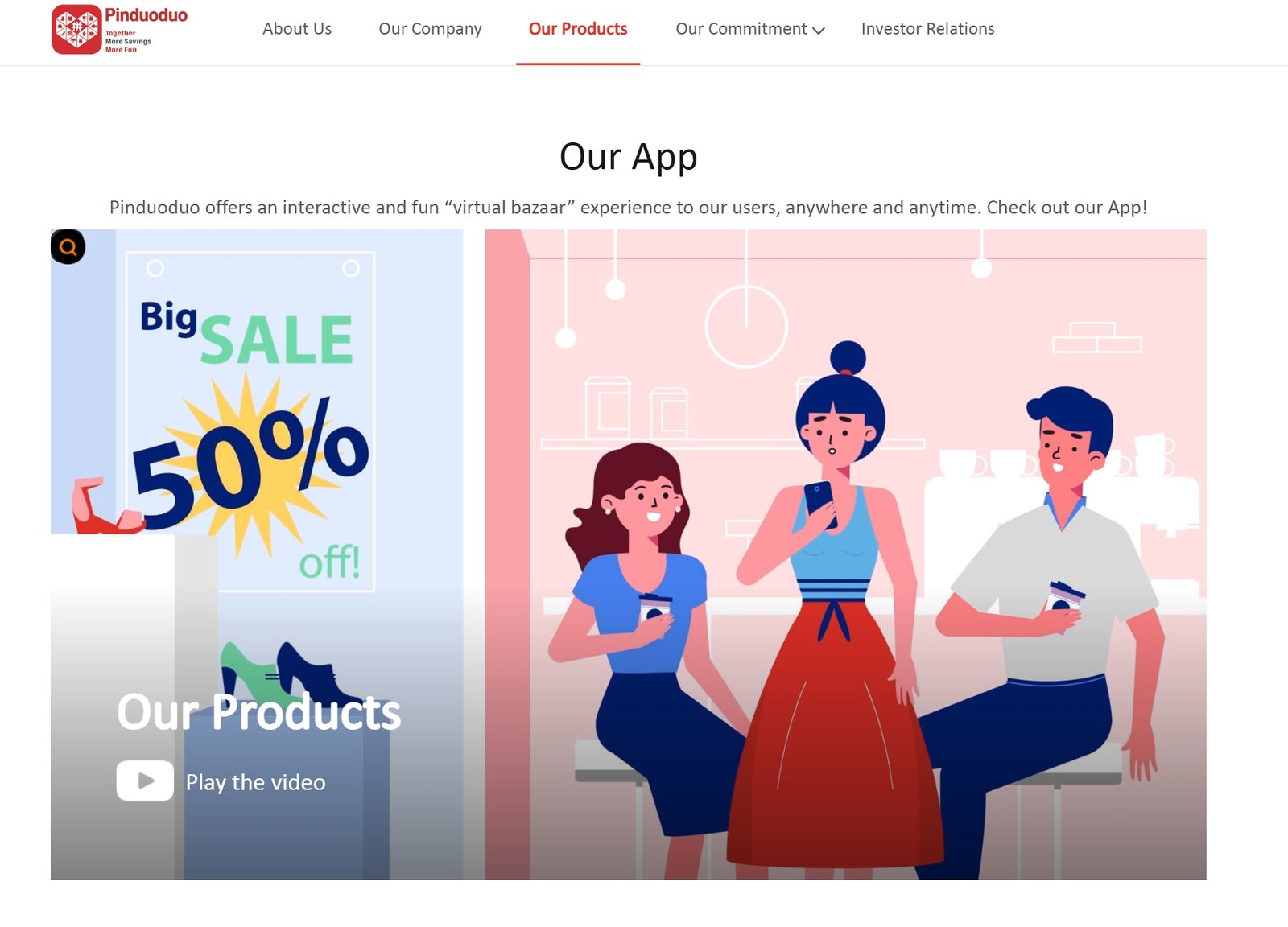
Shein
Founding and Brand Positioning: Established in 2008, Shein initially entered the market with a focus on fashion apparel, drawing a large customer base of young, trend-conscious women. As its brand influence grew, Shein expanded into beauty, home goods, and accessories to diversify its product offerings.
Market Expansion: Although headquartered in Singapore, Shein primarily targets markets in Europe and North America. Through strategic expansion, Shein has rapidly become a prominent global player in fast fashion retail, maintaining strong brand recognition among young consumers.
Brand Identity: Shein is known for its trendy, affordable fashion offerings. Through unique designs, fast product updates, and competitive pricing, Shein has built a strong brand image among young women. Unlike traditional retailers, Shein can quickly produce and launch on-trend items, meeting the demand for fashion and individuality.
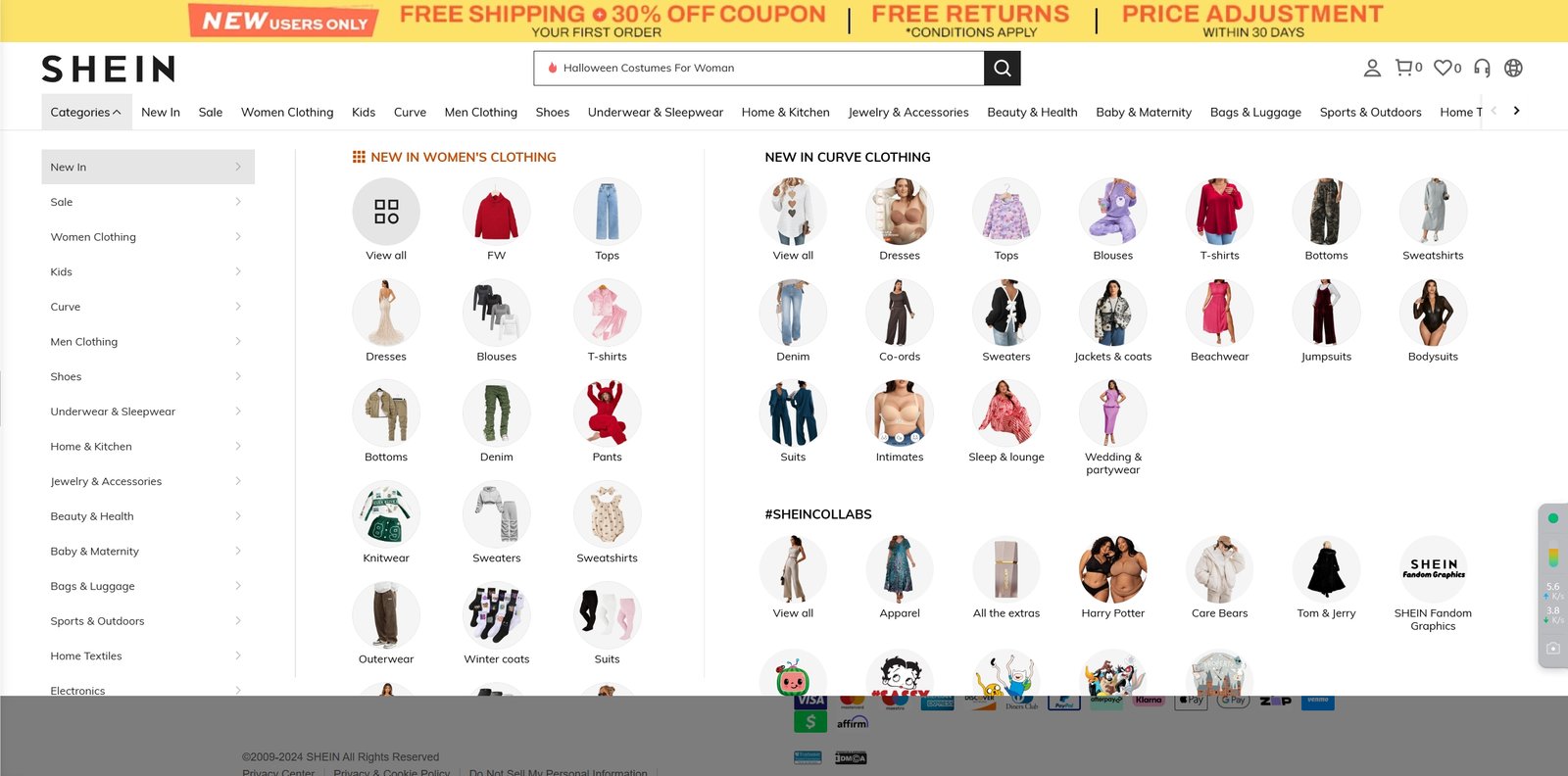
Business Model and Operational Strategy
Temu
Marketplace Model: Temu operates as an online marketplace, connecting third-party sellers from around the world with consumers. Unlike traditional e-commerce platforms, Temu does not manage inventory directly but instead relies on sellers for product stock, with the platform handling order processing and logistics. This model minimizes inventory risks and reduces operational costs.
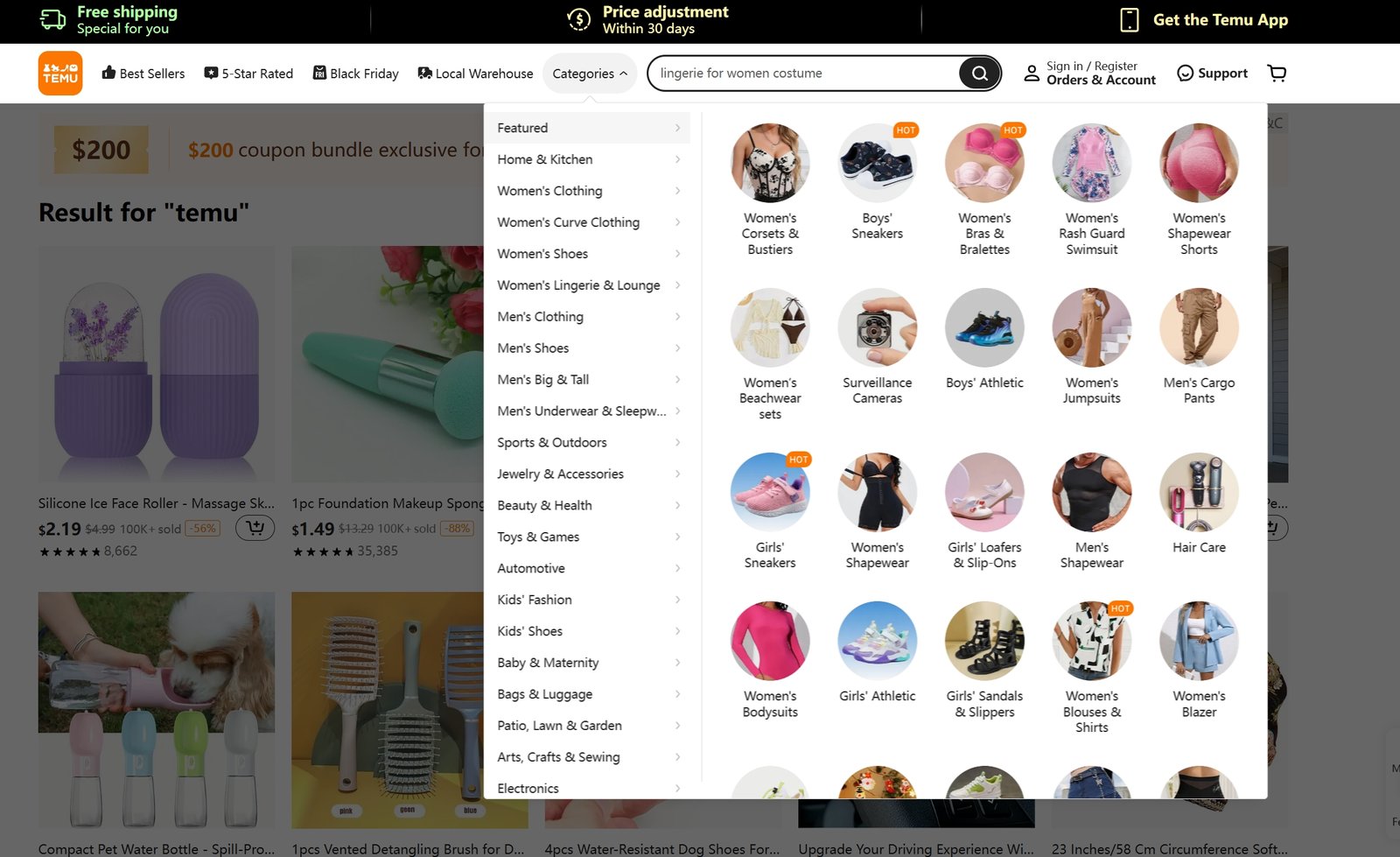
Order Processing and Profitability: Temu attracts customers through profit-sharing and promotional discounts, with sellers preparing orders and the platform coordinating shipping. This model allows Temu to adjust prices flexibly and offer attractive discounts to customers.
Supply Chain Advantage: As a Pinduoduo subsidiary, Temu benefits from China’s extensive supply chain network, ensuring competitive pricing for products and better catering to price-sensitive users.
Shein
Integrated Model: Shein uses a vertically integrated model, with its own design team and supply chain system. This approach not only maintains product quality but also shortens time-to-market for new items. Unlike Temu, Shein‘s direct control over its supply chain allows it to respond quickly to market trends.
Product Innovation: To cater to the preferences of young consumers, Shein adopts a fast product update strategy, releasing new items every week. This operational style enhances Shein‘s competitiveness in the fashion retail sector.
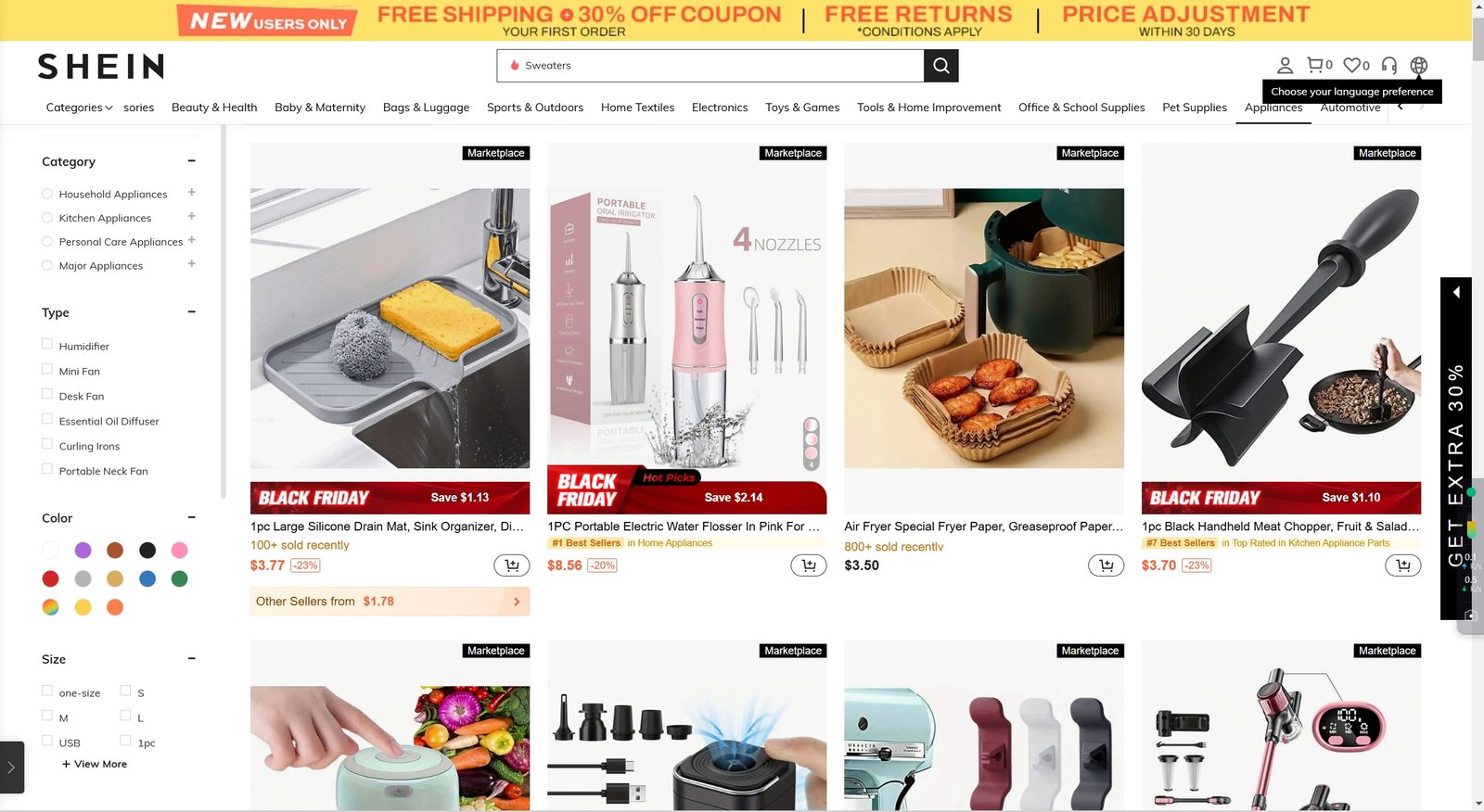
User Targeting: Shein primarily attracts young, fashion-oriented consumers by offering unique designs and trendsetting styles. This distinct user targeting has helped Shein establish a vibrant brand identity and attract a large audience of fashion-conscious buyers.
Supply Chain Efficiency: Shein collaborates closely with selected suppliers and enforces strict supply chain management to ensure rapid product launches. This integrated approach not only boosts Shein’s supply chain efficiency but also ensures that new products reach the market quickly.
Product Variety and Quality Comparison
Product Range
Temu: As a one-stop shopping platform, Temu offers a wide variety of products, including home goods, electronics, baby products, and clothing. This broad product range allows it to meet diverse consumer needs, particularly appealing to value-focused shoppers.
Shein: Shein focuses on trendy clothing and accessories, with recent expansion into beauty and home categories, though it remains primarily fashion-oriented. Its designs stay up-to-date with current trends, catering mainly to young female consumers.
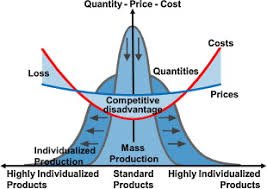
Product Quality
Shein: In the fast fashion sector, Shein has a reputation for trend-driven apparel with fabrics and designs that appeal to fashion-forward young adults. However, as a fast fashion brand, quality can sometimes vary, with some buyers reporting durability issues for certain items.
Temu: With its broad product categories, Temu‘s product quality can be inconsistent. Some items may not match Shein‘s quality reliability, but for price-sensitive consumers, Temu offers a variety of options. Shoppers are encouraged to check reviews closely to ensure products meet their expectations.
Pricing Strategy and Promotional Activities
Pricing Strategy
Temu: Leveraging the supply chain advantages of its parent company, Pinduoduo, Temu attracts users with very low prices and frequent discounts, especially in categories like electronics and home goods. This approach has made it highly popular with budget-conscious customers.
Shein: While Shein also offers competitive prices, its positioning is slightly higher than Temu. Its pricing is driven by the fashion appeal and design value of its products, supplemented by a variety of promotions like points and discounts to attract trend-driven shoppers.

Promotional Activities
Temu: Primarily relies on group-buying deals and limited-time discounts, with frequent price fluctuations. By using data analytics to refine its pricing strategy, Temu frequently offers discounts on specific product categories to stimulate purchase frequency.
Shein: Engages users with seasonal sales and loyalty points to maintain user engagement, providing personalized coupons, student discounts, and more. Shein’s unique points system can be used for future purchase discounts, encouraging continuous engagement from shoppers.

User Experience and Site Functionality
Website and App Design
Temu: The interface is simple and functional, focusing on easy navigation and quick checkouts. The “quick view” feature allows users to see product details without leaving the current page, making shopping more convenient.
Shein: The design is trendier, with personalized recommendations and styling suggestions that increase user interaction. Shein’s app also offers a virtual try-on feature, enhancing the shopping experience.
Overall User Experience
Shein: Stylish interface design appeals to trend-conscious young consumers. Personalized recommendations and styling tips enhance interactivity, creating an engaging shopping experience.
Temu: The straightforward interface is functional and appeals to value-conscious shoppers. The quick view feature enables efficient browsing and purchasing, ideal for everyday value shopping.
Logistics and Delivery Services
Delivery Time
Temu: As a cross-border e-commerce platform, Temu’s standard delivery time typically ranges from 7 to 20 days, with potential delays during holiday periods. Expedited shipping is available in select regions but with limited coverage.
Shein: Shein has multiple global warehouses, supporting multi-warehouse shipping. Its standard delivery time is usually between 7 to 15 days, with expedited shipping available in 3 to 7 days. Customer reviews generally highlight positive feedback on its delivery speed.
Logistics Partners
Temu: Works with international logistics companies like DHL and UPS, but mainly relies on third-party logistics, resulting in relatively limited control over the shipping process.
Shein: Partners with local logistics companies and owns some of its warehouses, giving it stronger control over its logistics. This model allows Shein to offer faster and more stable delivery services.
Overall Logistics Experience
Overall, Shein is more reliable in terms of logistics stability compared to Temu. Shein’s self-owned warehouses and collaboration with local logistics companies create a more efficient delivery system that better meets cross-border shipping demands. User feedback indicates that Shein generally provides quicker and more dependable delivery.
Shein’s Warehouse Advantage
With multiple warehouses globally, particularly in North America and Europe, Shein outperforms many other cross-border e-commerce platforms in delivery efficiency. This setup enables faster response times for orders, reducing delivery durations and enhancing customer experience.
Customer Service and Return Policies
Return Policies
Temu: Offers a 30-day return policy, though users need to cover the return shipping cost, and some products are non-returnable. This policy may pose some inconvenience for users.
Shein: Allows 30-day returns with no reason required. The first return is free of charge, with subsequent returns requiring the user to pay shipping. This policy helps reduce return costs for users, enhancing their shopping experience.
Customer Support
Temu: Customer service response times are relatively slow, particularly when handling post-sale issues and refunds, which can be a cumbersome process. User feedback suggests that Temu’s customer support experience needs improvement.
Shein: With a more comprehensive customer support system, Shein provides quick responses. Customers can contact support through the app, resulting in a smoother post-sale experience, which contributes to higher user satisfaction.
Payment Options and Security Measures
Payment Options
Both Temu and Shein support multiple payment methods, including credit cards, PayPal, and installment plans such as Afterpay, meeting the needs of diverse customers.

Security Measures
Both platforms employ SSL encryption technology to ensure payment security, providing enhanced transaction protection, especially for cross-border payments. Additionally, Shein has a more comprehensive payment system and privacy protection measures, further safeguarding users’ payment security.
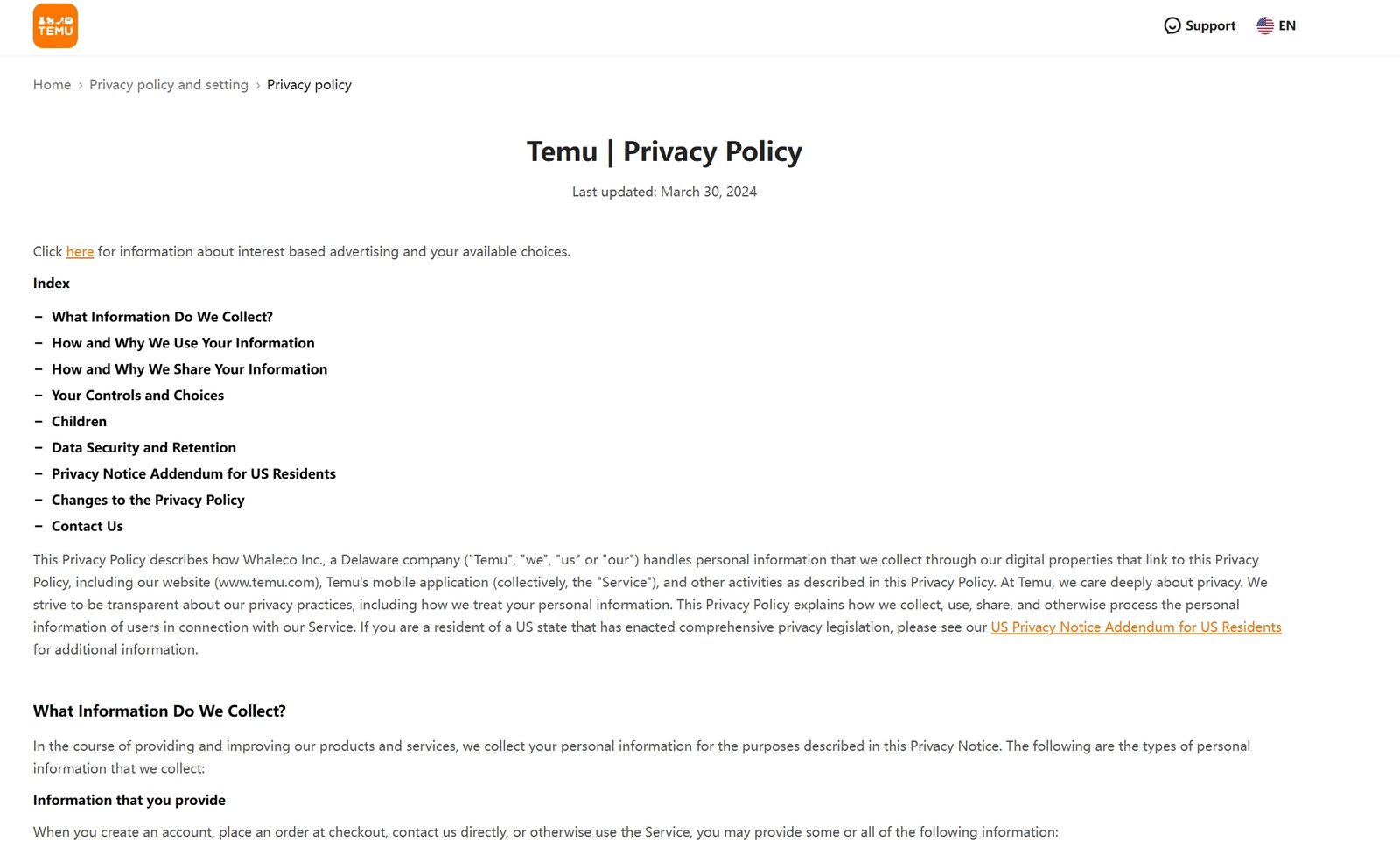
Diverse Payment Options
Both platforms support installment payments (such as Klarna and Afterpay). Temu relies more on external payment platforms, while Shein has a more advanced payment system and privacy measures, which may influence user trust in the payment experience.
In conclusion, Shein outperforms Temu in logistics and delivery services, customer service and return policies, as well as payment options and security measures. Consumers can choose the platform that best suits their needs and preferences.
Social Media and Marketing
Social Media Marketing
Shein: Shein has a well-established social media marketing strategy, collaborating with influencers to create a young, trendy, and diverse brand image on platforms like Instagram and TikTok. Marketing content often includes styling tutorials, fashion inspiration, and lifestyle presentations.
For example, Shein partners with popular fashion bloggers, inviting them to create outfit videos showcasing the latest items each season. Additionally, Shein frequently hosts online fashion shows, allowing fans to engage, which boosts both loyalty and brand recognition.
Temu: In contrast to Shein, Temu’s social media marketing focuses more on its affordability. The Temu brand emphasizes high value and frequent discounts, investing less in content marketing.
While Temu maintains some activity on Instagram and TikTok, most of its content consists of discount announcements and short-term promotions, attracting more price-conscious users.
Occasionally, Temu collaborates with lifestyle influencers to create videos highlighting household items or kitchen gadgets, emphasizing practicality and affordability, though its brand reach and impact remain limited compared to Shein.
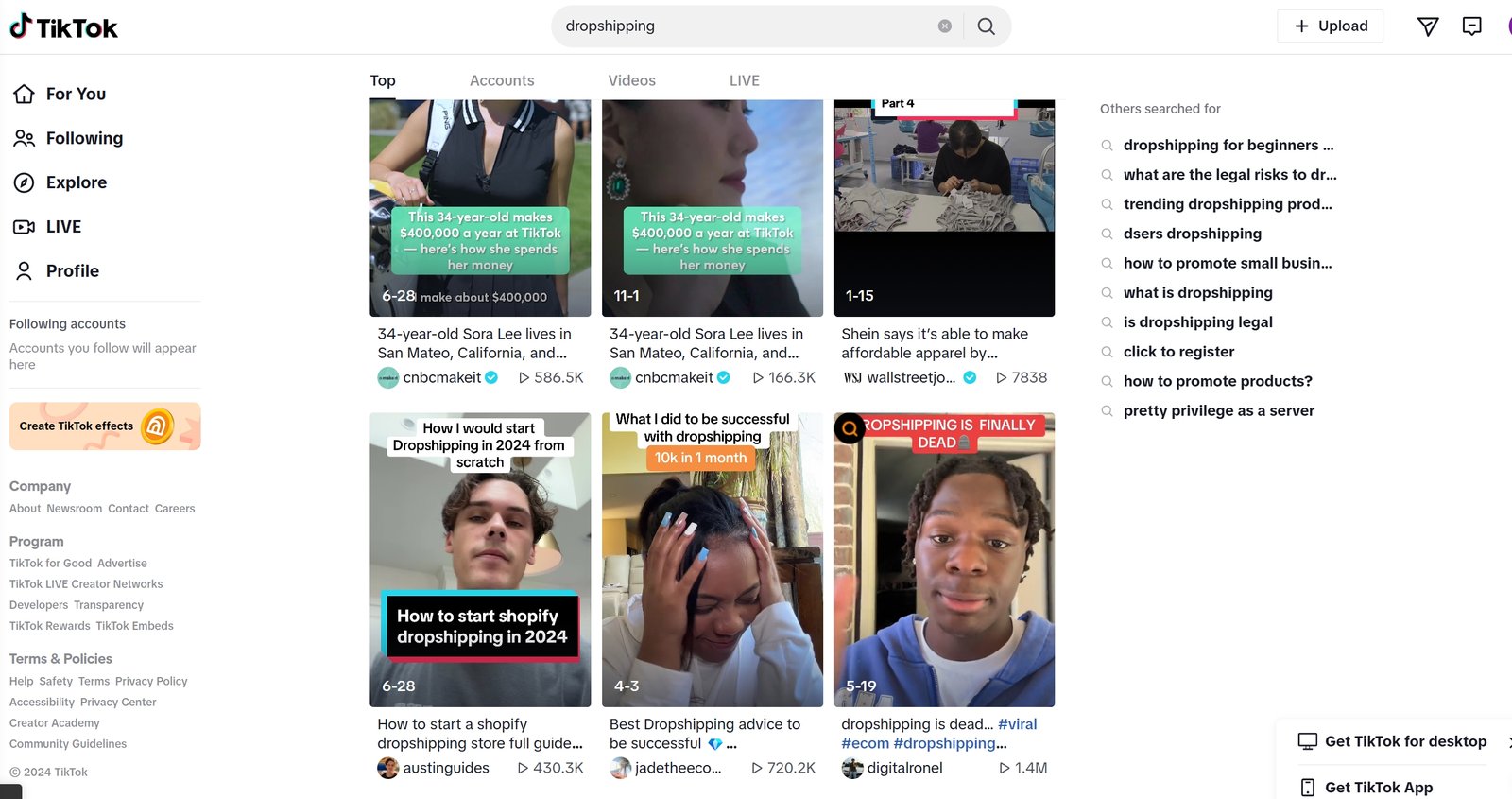
Shein’s Social Media Events
Shein actively designs social media events, particularly fashion live-streams and styling recommendations. Shein’s live streams are more than just product showcases—they allow users to participate in real-time brand engagement.
For example, during major shopping events like Black Friday or Double Eleven, Shein collaborates with influencers for joint live streams, featuring seasonal bestsellers and hosting giveaways, which attracts substantial viewership. Shein also maintains an active presence in comment sections, frequently interacting with fans to foster closeness and brand trust.
Temu’s Advertising Strategy
Temu mainly relies on extensive advertising to build brand recognition, working with platforms like Google, Facebook, and YouTube to reach a broad audience across various markets.
Emphasizing low prices and fast shipping as its main selling points, Temu ramps up advertising during end-of-season sales, promoting discounts as low as 80% off to attract buyers. Temu also frequently distributes discount codes on money-saving forums and groups, targeting price-sensitive customers.
Marketing Impact
Shein’s influence on social media is significantly stronger than Temu’s, especially among young female consumers. Shein has become synonymous with “social media fashion brand.” Meanwhile, Temu has built brand recognition mainly among price-conscious consumers. Although Temu invests heavily in advertising, it lacks the distinct brand identity and loyalty that Shein has established.
Sustainability and Social Responsibility
Environmental Initiatives
Shein: In recent years, Shein has recognized the importance of environmental responsibility and has launched several sustainability initiatives. For example, Shein introduced a clothing recycling program, encouraging consumers to return old garments in exchange for shopping credits.
This initiative not only contributes to environmental protection but also boosts the brand’s social responsibility. Additionally, Shein has gradually increased the use of eco-friendly materials, such as recycled cotton and sustainable polyester, aiming to reduce resource consumption and carbon emissions.
Temu: Comparatively, Temu has been slower to adopt environmental measures. Currently, Temu has not implemented significant eco-friendly initiatives and remains primarily focused on enhancing supply chain efficiency.
In terms of product packaging, Temu has not yet introduced biodegradable materials, which reflects a comparatively limited commitment to environmental concerns. However, Temu’s price advantage continues to attract cost-sensitive consumers, posing a future challenge in balancing affordability with environmental responsibility.
Social Responsibility
Shein: Shein has actively participated in social welfare and charitable activities. For example, Shein has donated to educational causes aimed at supporting underprivileged children and has contributed to community development projects.
Furthermore, Shein has invested in employee welfare by providing comprehensive health benefits and professional development training, which enhances the overall work experience for its employees.
Temu: Temu has focused more on improving supply chain efficiency, directing resources towards competitive pricing and logistics optimization. While Temu has participated in a few smaller-scale charitable activities, its social responsibility efforts have been relatively limited, with a primary emphasis on cost control and operational efficiency.
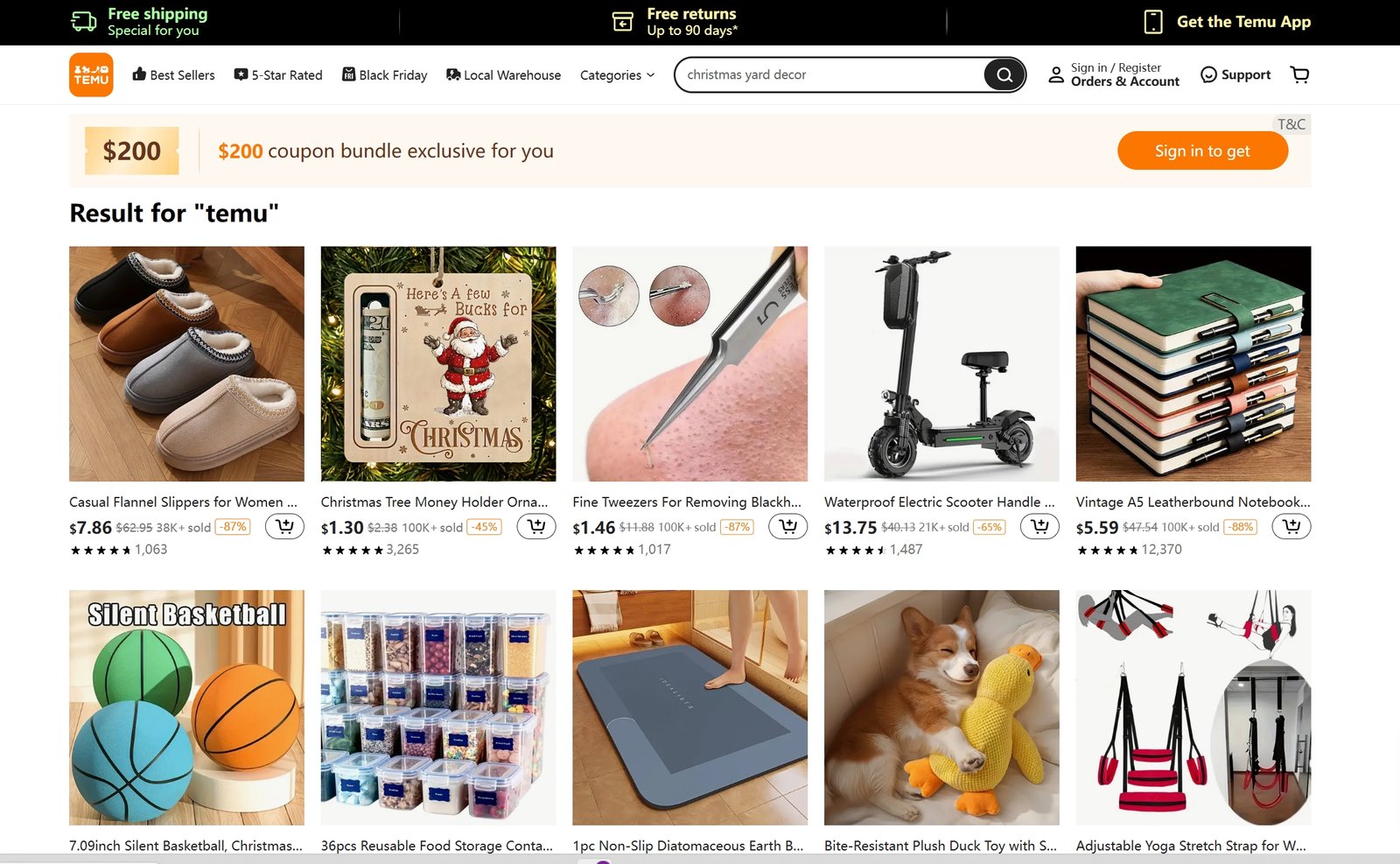
Case Studies
Case 1: Shopping Experience on Shein
Grace, a university student with a keen interest in fashion, started shopping on Shein after a friend’s recommendation. She appreciated that Shein’s clothing follows the latest trends, offering a wide range of styles at reasonable prices.
On one occasion, she purchased a dress and a pair of jeans. Shortly after payment, she received an order confirmation email from Shein, and through the tracking feature, she could monitor the package’s progress.
About ten days later, the package arrived, and she was pleased with the quality and comfort of the clothing, exceeding her expectations. Since then, she joined Shein’s membership program, enjoying discounts and earning points, which increased her shopping frequency on the platform.
Case 2: Shopping Experience on Temu
Another consumer, Mr. Jack, opted for Temu to purchase household items, as he found the prices for home accessories on Temu very affordable. He ordered some kitchen tools and an electronic device, and after paying, he noticed the shipping information was slow to update.
The delivery took nearly two weeks to arrive. He was satisfied with the quality of some items, especially the kitchen tools, which proved to be quite useful. However, he found the electronic device had stability issues, and although Temu offered a return option, he decided against it as the process felt cumbersome. While he acknowledged Temu’s attractive pricing, he felt there was room for improvement, particularly in logistics and product quality control.
Differences in Target Audience
Shein: Shein’s primary demographic is young women aged 18-30 who are fashion-conscious and keep up with trends. Shein’s designs and marketing are well-aligned with this group, who value style, design, and versatility in their purchases, while being less sensitive to price.
Temu: Temu appeals to a more diverse audience, including price-conscious family shoppers, students, and small business owners. Temu’s wide variety of products meets the needs of customers seeking household goods, office supplies, and basic necessities. These shoppers are more price-focused and less concerned with trends or fashion-forward design.
Summary and Platform Selection Recommendations
Platform Selection
Shein: Shein is suitable for consumers who value trendy designs, product quality, and fast delivery, particularly younger buyers. With its extensive social media presence, fashion-forward styles, and efficient logistics, Shein is an ideal choice for customers seeking fashionable clothing and a positive shopping experience. For those focused on trends and willing to pay more for quick shipping and high-quality apparel, Shein is a preferred platform.
Temu: Temu is more suitable for price-sensitive consumers interested in a wide variety of products, especially household items, daily essentials, and electronic accessories.
This platform offers lower prices and a broad selection, allowing users to find value-driven options. However, Temu’s logistics and customer service may be less efficient, making it a better choice for users who do not prioritize fast delivery.
Shopping Recommendations
When choosing a platform, consumers should consider their needs, budget, and tolerance for logistics speed and after-sales service. It’s advisable for users to carefully review product ratings and reviews, especially regarding shipping and after-sales experience, to make the most suitable shopping decision.
For those who value fashion, quality, and a seamless shopping experience, Shein is a stronger choice; whereas for those focused on price and variety, Temu may be more appealing.
ASG: Professional Dropshipping Services
ASG, led by CEO Janson, is a specialized dropshipping provider offering end-to-end support for e-commerce clients worldwide. ASG is particularly well-suited for startups and growing e-commerce platforms, providing one-stop support from sourcing to post-sales. ASG’s core value, “service first,” is reflected in its efficient and comprehensive dropshipping services, helping clients stand out in a competitive market.
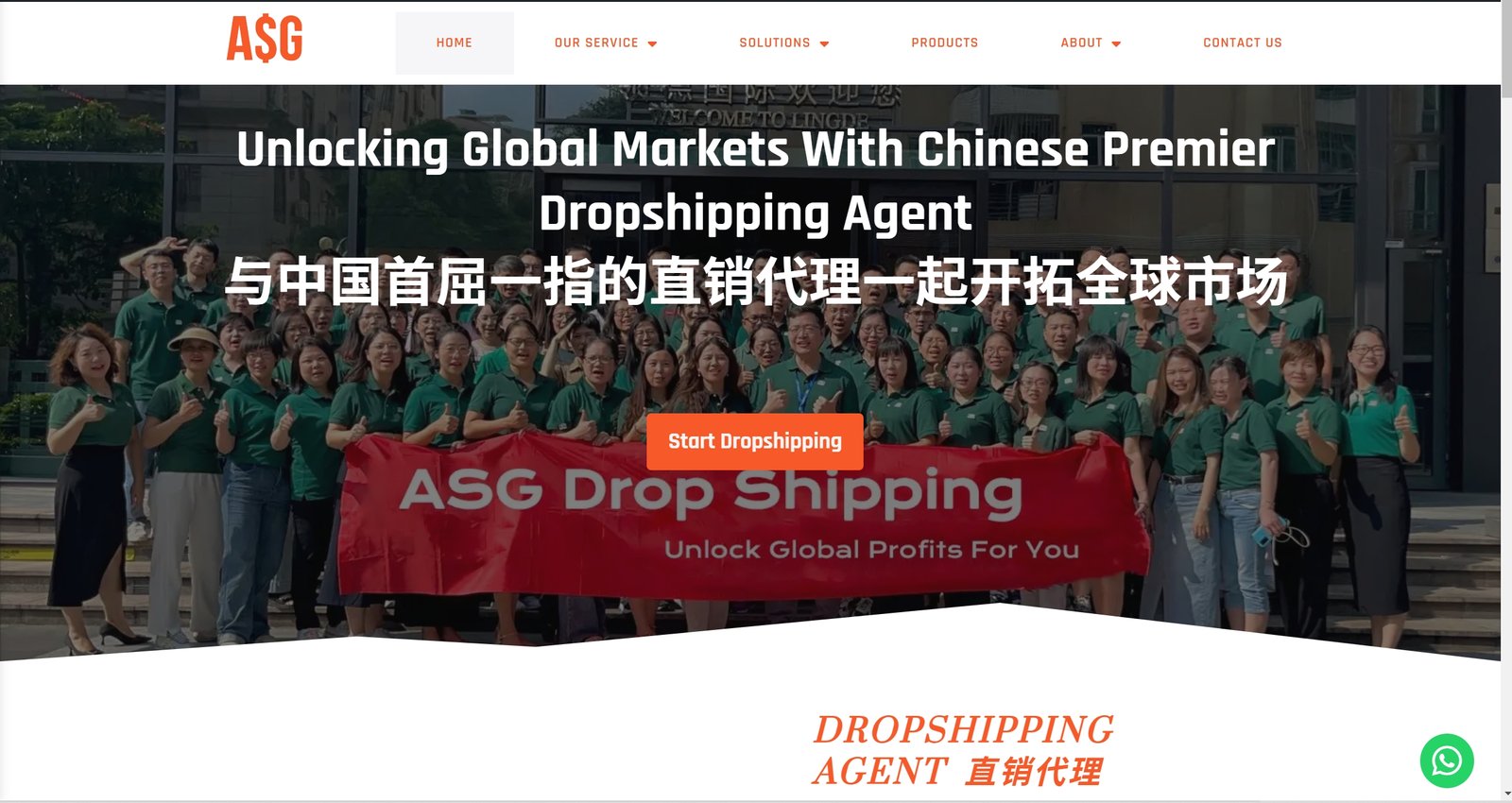
Comprehensive Service and System Support
ASG provides an advanced ERP system to help e-commerce clients automate store management. Each client has a dedicated customer representative, ensuring responsive and personalized service. This one-on-one support not only simplifies e-commerce operations but also significantly enhances management efficiency and customer experience, allowing e-commerce clients to focus on business growth.
Efficient Supply Chain and Reliable Sourcing
ASG has a robust supply chain network, leveraging 1688 and partnerships with over 2,300 quality factories, with a steady inventory supply that ensures a reliable source of products and a wide selection. Whether for popular items or custom orders, ASG meets various e-commerce needs, ensuring high product quality and providing clients with premium sourcing options.
Logistics and Cost Advantages
ASG’s logistics network covers global destinations, supporting fast shipping within 5 to 8 days, greatly enhancing clients’ service competitiveness. Through optimized procurement processes, ASG effectively reduces clients’ purchasing costs by 10%-30%. This allows e-commerce clients to offer competitively priced products, further strengthening brand appeal and market competitiveness.
Long-Term Value and Partnership Philosophy
ASG is committed to a philosophy of integrity and long-term value, never sacrificing service quality for lower prices and avoiding arbitrary price increases. ASG is dedicated to providing stable pricing and high-reliability services, aiming to build long-term partnerships.
ASG views clients as lasting partners, working together to expand the market and pursue win-win relationships. Emphasizing sustainable business value, ASG consistently attends to clients’ needs, accompanying them at every stage of growth as a trusted partner.